Meet the Chelsea debutants putting it all on the line
Welcome to Day 2 of my special coverage of this year’s Chelsea Flower Show. Today, I talk to up-and-coming designers about the trials and tribulations of building a show garden at Chelsea
It’s Day 2 of Chelsea Flower Show week, which means one thing: medals.
Personally speaking, the awarding of medals seems a little out of step with the majority of people’s experiences of gardening and growing. Of course we want to create comfortable, beautiful spaces, be that on a balcony, a courtyard, a small urban plot, a sprawling estate, or even inside a bedroom. But by what objective measure, really, can we say that one space is better than another?1
Those who take home a gold won’t think twice about any of this, of course, but to anyone whose show garden or display (floral awards are also handed out to the nursery owners and growers in the Great Pavilion) falls short of the judges’ gold medal standards, it can really sour their entire Chelsea experience. An experience that began, let’s not forget, months and months before the show started, and that often involves a sponsor or charity partner investing heavily in the project.
Unfortunately, not everyone shares my opinion that the awards aren’t all that important. As such, there is an awful lot riding on the results, which have the power to make or break a young designer’s career.
Yesterday, I caught up with five of these young designers, all Chelsea first-timers whose show gardens appeared in two of the “smaller” design categories.2 Bear in mind that these interviews took place before the designers knew which medals they had been awarded. Also bear in mind that, regardless of what medals they were handed this morning, the reason I spoke to them all in the first place is because I personally felt that their gardens were exceptional.3
These interviews have been edited for length and clarity.
Andy Smith-Williams, designer of The Core Arts Front Garden Revolution in the All About Plants category
Medal: Gold
Andy’s garden was the only one that I saw from the inside, rather than from behind a little rope, after he kindly invited me in for our chat. This meant that I experienced it in a completely different way to all of the others. I loved it. The overarching concept is that two urban households have removed the boundary dividing their front gardens, and created a large communal space in which to socialise and garden together. I spoke to Andy whilst sitting in his garden on a bench made out of 100-year-old reclaimed school flooring, and trying desperately hard not to squish any of the little flowers growing up through the gravel at my feet.
This is a funny place to have a garden – under a massive roof. Did that bring about any particular challenges?
Yeah, it is a bit strange. Well, there’s the lack of sun, obviously. There are LED grow-lights hanging from the ceiling – apparently they’re set to the same Kelvin as 2pm sunlight, so it should be helping the plants, but I don’t think it’s strong enough for them to grow towards. It just keeps them looking healthy for a few more days. But then, you’re out of the rain as well – and it has been pretty torrential. So it’s got its positives and negatives.
What’s unique about Chelsea is that a group of people walk around with clipboards in hand and judge your efforts. How are you feeling about that?
Good. I’m not putting too much pressure on it. I’m really happy with how the garden has turned out and I’m getting a lot of positive comments – people really like the planting – so I’m just enjoying it. Obviously when you put that much effort into something, you’d like people who know about the subject to think that it’s a good design and that it works, but I’m not really thinking too much about the medal too much.
Sitting here in your garden, it doesn’t at all look or feel like somewhere that didn’t exist last week.
I think that’s partly because of the materials we’ve used – it’s got that kind of worn feel. And I tried to make the planting feel as natural as possible, as if stuff’s self-seeded in places and coming up through the gravel and doing its own thing. And I think having plants like Herb Robert, which is normally like a weed in your front garden, as part of the design helps with that as well.
I’m not an RHS judge, but I find it really refreshing to see what most people think of as a weed in a Chelsea show garden – it makes it feel more real and relatable, compared to some of the more polished gardens on Main Avenue.
Yeah, we wanted it to feel really attainable, to key into that mental health idea, so people could feel like they could go and take some of the ideas and do it at home. So I tried to pack it full of ideas that it’s not too hard for people to recreate at home, but do it in their own way, hopefully.
Jason Williams, designer of The Cirrus Garden in the Balcony and Container Gardens category
Medal: Silver-gilt
Jason, aka @cloudgardeneruk, only started gardening during the first lockdown back in Spring 2020, when he began growing plants and beautifying his small balcony on the 18th floor of a central Manchester tower block. His Chelsea garden is a reflection of his learnings from his short but intense experience of high-rise gardening.
Your gardening journey has been relatively short to date – what does being at Chelsea as an exhibitor mean to you?
It’s really surreal. I came last year as a guest and I struggled to see anything that I could bring back home with me. I made a YouTube video about it actually, and in it I showcased some people in my Facebook group and showed just how beautiful their gardens are. And at the end of the video I said: “Listen, I am going to come to Chelsea next year and I am going to show everyone…” But I didn't actually think that was going to be true!
How important is the whole judging process to you?
The garden is now complete. I love it, it’s pretty. And I did want an award, but the planting style, it’s very much not Chelsea; it’s like, my own individual take. The plants are plants that are picked up from local garden centres, Chorlton Plant Nursery for example have grown a lot of my plants. And what I’ve really wanted is to make it feel real; is to make it feel like home. I wanted people to look at this and walk away and feel like they can replicate at least some of it – maybe not the fancy planters, but the planting scheme, the planting list – and that really really inspired me. And that’s what I wanted to achieve. And I had to kind of learn that maybe I won't get a medal this year, but, you know, that's not the point of the garden. The point is to encourage people and get more people gardening.
Like me, you’re new not just to Chelsea, but to the whole world of gardening. Have you felt welcomed?
Everyone has been so supportive. I think everybody is really conscious and really aware of what it is that I’m trying to do, and what I’m trying to achieve. So actually, although I am the new new boy, people have been very nice and very welcoming.
How much is this show garden a recreation of your space at home?
So this whole garden is an amalgamation of all the best elements of my garden. Anything that doesn’t work, I took out. But the arches you’ll find in my garden, the pond you’ll find, and the planting is all plants that I’ve grown before in my garden. I’ve made sure that you can pick up these plants in Homebase, B&Q, Wilko’s, your local garden centre.
Tell me about your blank back wall, which doesn’t look like much but I gather is an important design detail.
The back wall is so, so important. I made sure to not paint it, to not do anything with it – that’s the standard neutral colour that the RHS give you [when you are given the blank balcony space before building the garden]. Because as a renter, you can’t just start putting in shelves and lighting fixtures and mirrors and things like that. In actual fact, in my garden and most other balcony gardens, that wall would be cladding, so you can’t do anything. So the garden is literally: “This is your space, use it.”
Bea Tann, designer of The Enchanted Rain Garden in the Balcony and Container Gardens category
Medal: Silver-gilt
At just 22 years of age, Mancunian Bea Tann is the youngest show garden designer at Chelsea this year. Not that you’d know it from her design, which is sophisticated, evocative and, living up to its name, enchanting. All mosses and ferns and hostas, it celebrates the soggy beauty of the English north.
What’s the inspiration behind your garden?
I’m from Manchester, and in Manchester we have more rainy days than sunny days, so I thought if I was going to create a Manchester garden, it needs to be something that looks its nicest in the rain. So I chose to use these mossy containers, which we actually brought from Manchester.
They look heavy.
Very, very heavy. That one at the back is like 900 kilos. It’s insane. But they really glow in the rain, and the moss looks so nice, and it’s perfect for a rainy, shady courtyard like this.
So the containers had the moss growing on them already? You didn’t superglue it on just for Chelsea?
Yeah, they did, and I think it’s because they’ve been stood in the rain in Manchester in this reclamation yard for years, building up all of that moss, and that’s why they look so great.
Your garden feels very realistic and relatable.
Definitely, I think so. And especially for young people. Nowadays, people don’t want to stay in the same house forever, or a lot of people rent and never even buy a house. If you’re gardening in containers, you can just take them with you [when you move], rather than putting all this effort into a garden where you’re just going to move, or it’s not actually your garden.
How do you feel about the judging process?
I’m nervous, but whatever happens, I’m really happy with it. It’s surpassed my expectations for what it would look like. And I’m the youngest here, but I didn’t want it to just be good because I was the youngest, I wanted it to speak for itself without that, and I think hopefully it does. To me it does. And that’s what I’m really happy about.
Pollyanna Wilkinson, designer of The Mothers for Mothers Garden – ‘This Too Shall Pass’ in the All About Plants category
Medal: Silver
Pollyanna’s garden is intended to reflect the experiences of mothers raising young children, and the associated mental health challenges, including isolation, anxiety and postnatal depression. But the garden is also designed to inspire, and to offer hope.
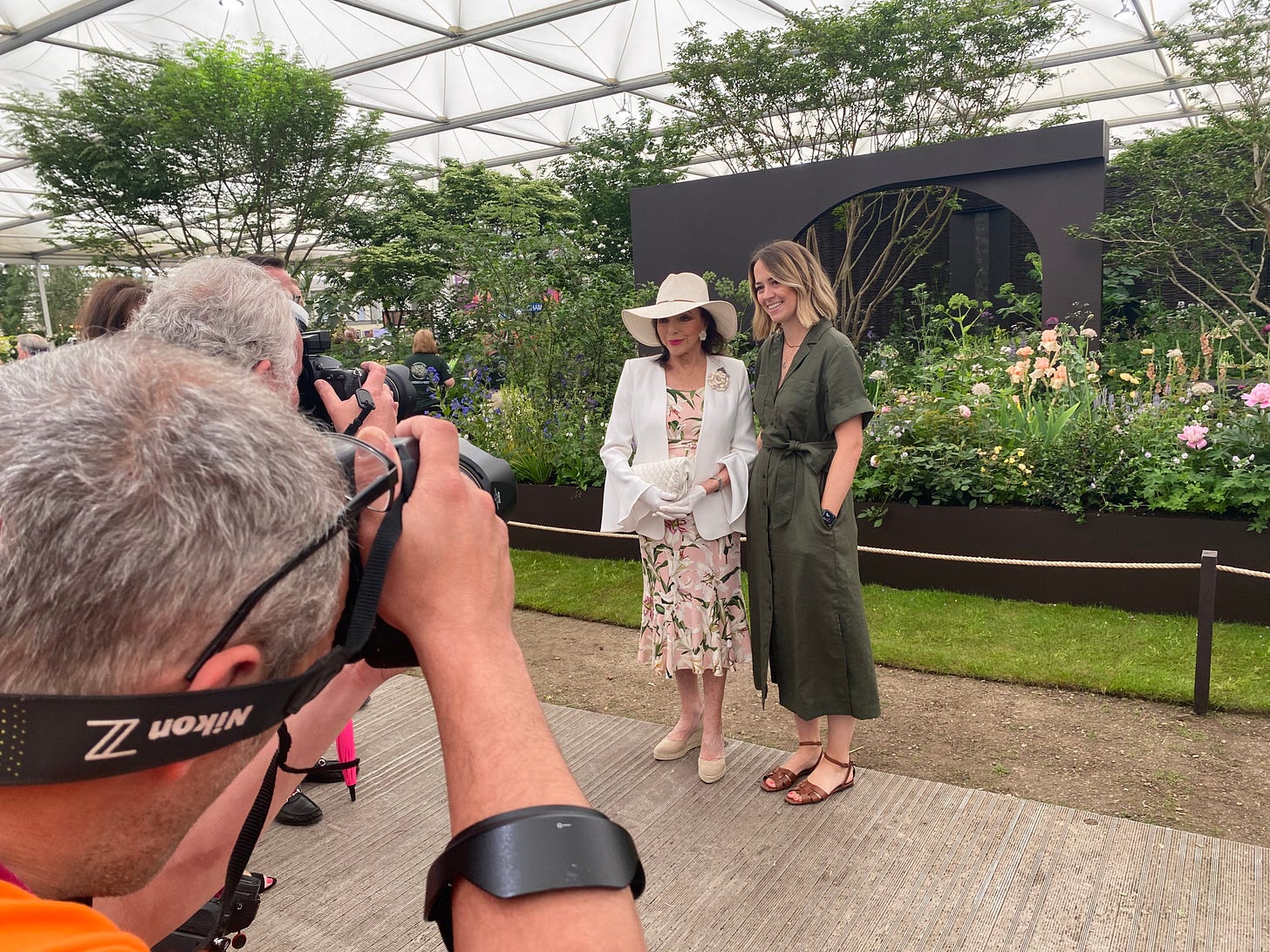
How does creating a garden for Chelsea differ from your normal design process?
I mean, it’s totally different doing a show garden to a residential garden. The way that you plant, the time of the year. So, it’s obviously planted to look great now, but this garden is going back to Bristol to be planted [after the show, for the charity Mothers for Mothers], so it needs to look good for them for more than just one week in May, so we’ve got lots of evergreen interest for the rest of the year. But also the planting densities are totally different to what I would do on a residential project, and we usually plant much smaller plants too. So, it’s night and day. And also, I’ve never planted on a stage before! Because you can’t dig in the pavilion. So that’s probably the biggest challenge, because everything has to be built up.
Are you pleased with how it has come together?
I’m very pleased. I think it conveys the message of the charity, and that’s what I wanted. I try and say it doesn’t matter about the medal, but this garden is very personal to me, and you put a year of your life into it, heart and soul, so it’s hard to pretend it doesn’t matter. I think it does. And putting yourself out for judgement of people I really respect... It’s scary. But you’ve got to take that risk.
William Murray, designer of The Potting Balcony Garden sponsored by Viking in the Balcony and Container Gardens category
Medal: Silver-gilt
William’s balcony was the first garden-related thing I saw when I walked onto the showground at Chelsea, and still one of my highlights. Sort of the antithesis of someone like Monty Don’s “potting shed” – which is more like a potting palace – William’s space shows how much actual, active gardening you can do even with a very limited footprint.
What was the inspiration behind this design?
People don’t always have big gardens, but they want to do gardening, so it’s a place where you can pot up your plants, you can sow seeds – hands on gardening tasks that you maybe probably wouldn’t associate with a balcony. We’ve got loads of edibles, so you can take things straight from the balcony into the kitchen.
Edibles are fairly unusual at Chelsea. Why did you decide to go down that route?
Well, my first thing was that I wanted an allotment, but in Richmond, where I live, it’s a 10 year wait list. So it’s that idea of, why should people wait to grow things like this when you can actually do it in a really small space? We’ve got potatoes, fruit trees, all sorts of things that you probably wouldn’t think about having on a balcony.
I love your mini greenhouse, where did that come from?
It’s made by a company called Harvst in Wales, and it’s a smart greenhouse, so it’s got irrigation, light, heat and ventilation. When it gets warm, the top lid there will open up. I set when it waters and how often it waters via an app, and if it drops below a certain temperature it will turn the heat on. And it’ll drop me an email if it runs out of water or if there’s any problems. It’s quite funny receiving an email from your greenhouse.
How are you feeling about being judged?
It’s terrifying. It’s Chelsea, and there’s experts judging your work. And [my garden design] business is really new, so it’s sort of trial by fire!
What do you make of the judging and medals-giving aspect of shows like Chelsea? Does your heart go out to these young designers?
Still to come this week on The Earthworm
I speak with specialist growers about their one-plant-mindedness; a Chelsea Pensioner about the horticultural circus in his back garden; and celebs and plebs alike about why they visit Chelsea and what – if anything – they’ve learned from the experience.
For an insight into how the judging process works, check out the latest posts on Jo Thompson’s Substack, The Gardening Mind. As well as being a gold medal winner herself, many times over, Jo was actually one of the RHS judges this year, and she has written up a fascinating behind-the-scenes look at the process.
All About Plants is a new category this year showcasing the positive power of plants on people and planet, and displayed, strangely, inside the marquee of the Great Pavilion. Meanwhile, the Balcony & Container Gardens category reflects how people might grow with limited space and access to growing in the ground.

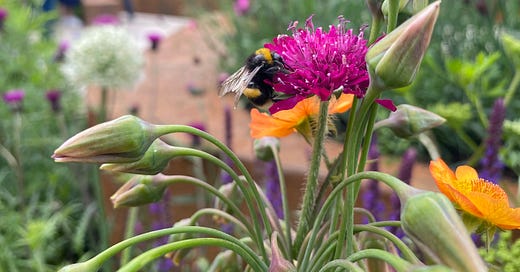




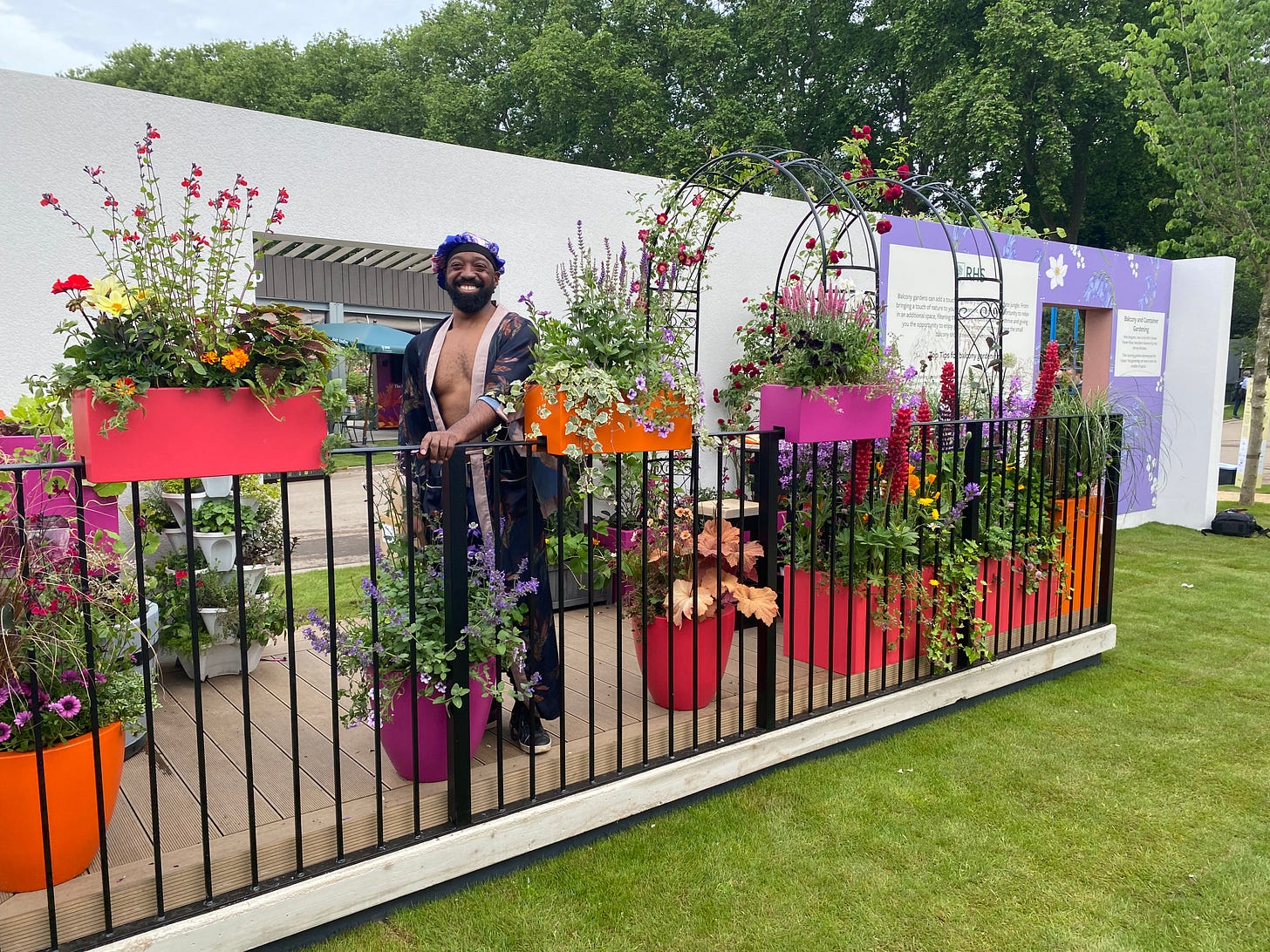
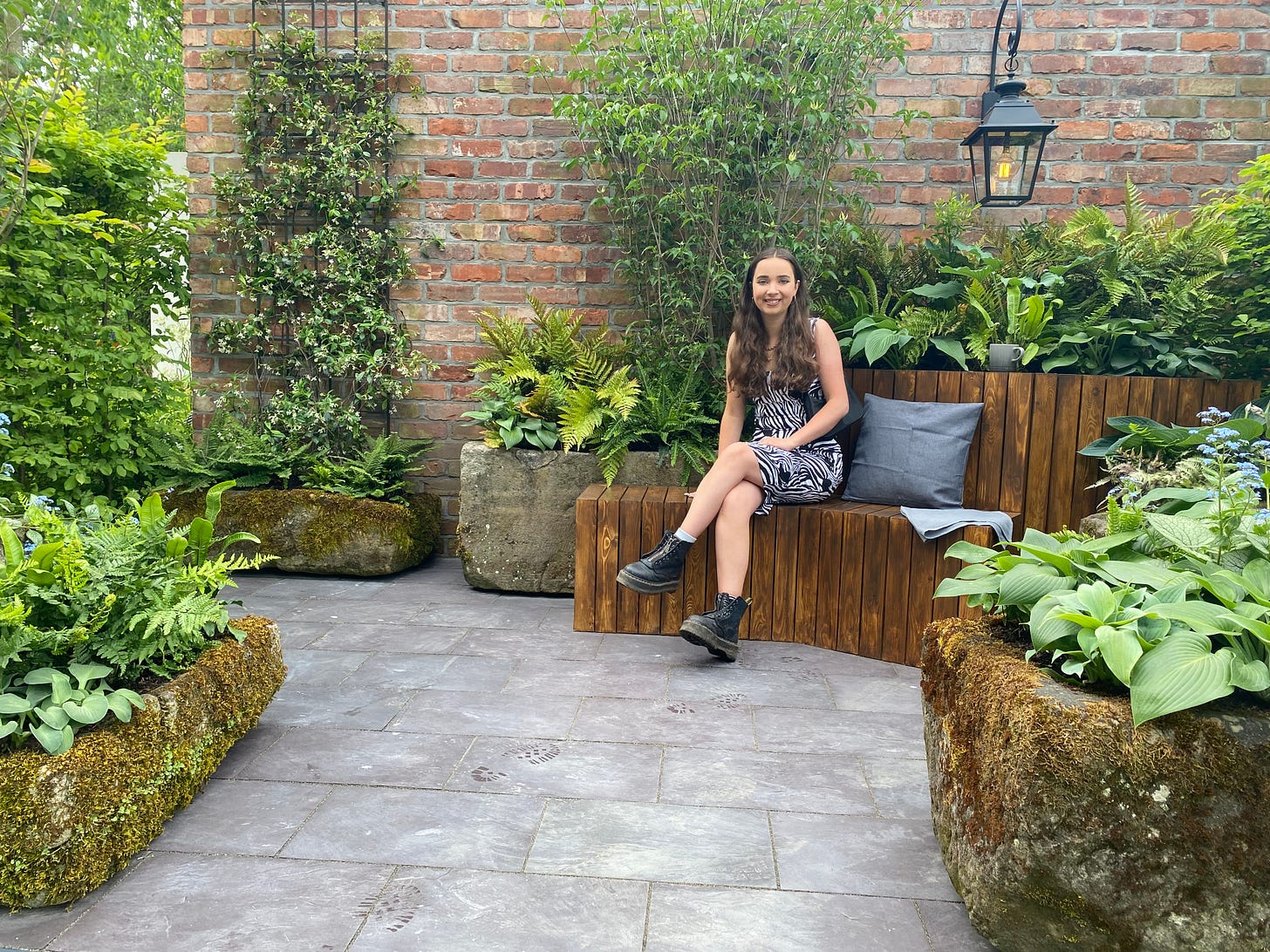
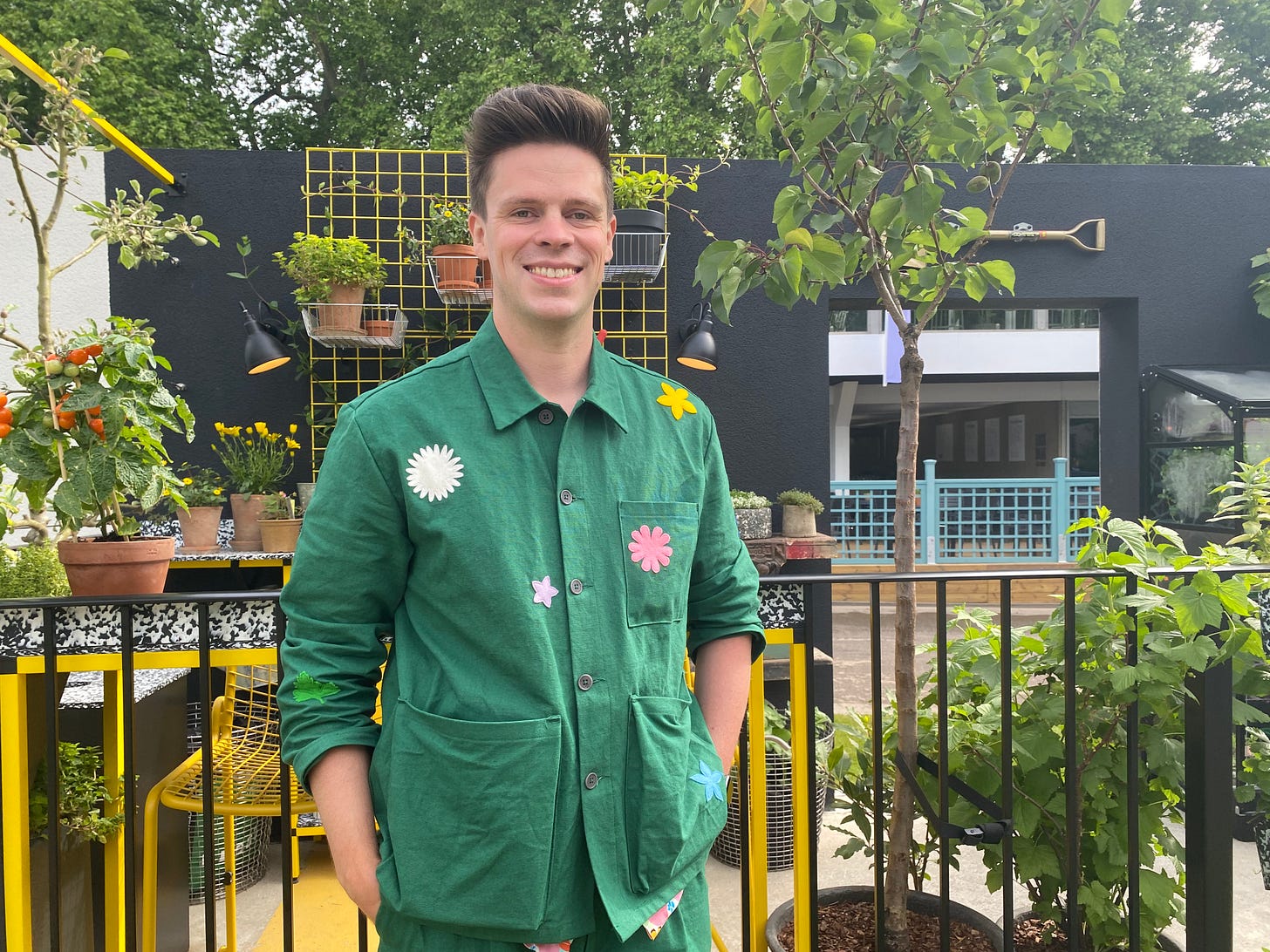
When Beth Chatto first displayed her naturalistic garden at Chelsea, they tried to ban her, telling her they were just weeds. I'm sure she's have a laugh at where they are at now.
Pretentious, over-crowded and over-priced it may be, but I love Chelsea, especially the Pavilion. Seeing the stunning displays people put their heart and soul into is overwhelmingly positive. Celebs, rules yayas and all, its still full of beautiful plants, and that can only ever be good.
Did your interviews kindle your own interest in maybe becoming an exhibitor yourself? Might we look forward to an Earthworm entry in 2023?